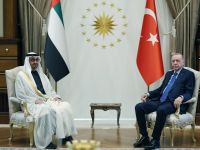Spun off Orascom Technologies last year, Orascom Telecom (OT) is one of Egypt's most exciting companies today, investing heavily and entering numerous international ventures. OT is the only company in Egypt to operate in all three privatized communications sectors — wireless, fixed line and VSAT technologies, and holds the majority of the ISP market share in Egypt (Internet Service Provider).
OT is part of the Orascom conglomerate, founded 50 years ago by the Egyptian Sawiris family. Today Orascom employs as many as 20,000 workers, in its five companies — Orascom Telecom, Orascom Construction Industries, Orascom Projects & Tourism Developments, Orascom Hotel Holdings and Orascom Technology Systems.
In mid-July OT has carried out the largest-ever Egyptian initial public offering (IPO). The $320 million IPO, which left the Sawiris family with 57 percent of OT, had been oversubscribed 1.7 times, with western institutions buying 55 percent of the shares offered; Gulf institutions — 15 percent; Egyptian institutions — 18 percent; and 12 percent going to high net-worth and other individuals.
Many perceived OT’s IPO as the possible savior of the Cairo bourse, as Orascom companies are considered a relatively solid bet in Egypt’s sometimes-irrational stock market. Market analysts say local investors sold stock in blue chips such as MobiNil, itself partly-owned by OT, in order to invest in OT's IPO. The company's shares rose 22 percent to $9.175 on the first day of trading in London, and 13 percent to 68 Egyptian liras (LE) on their first day in Cairo.
Despite this excellent debut, the stock recently fell victim to Cairo bourse's annual summer slump, and dropped as low as LE 42.47, on August 8, while performing equally as poor in London. Other sound stocks, such as Suez Cement, Commercial International Bank, and Orascom Construction Industries, all fared badly as well, and the benchmark Hermes index fell from 9023.50 on July 18, to 7401.39 on August 8.
Following a dreary month for the company, apparent European interest in the market newcomer last week pushed OT shares high in Cairo. OT chairman, Naguib Sawiris, confirmed that "several European telecom operators have expressed keen interest in Orascom Telecom in the form of mergers, acquisitions and strategic alliances but nothing detailed has been discussed."
Analysts and brokers, both in and outside Egypt, have recognized OT’s potential to attract foreign telecom firms. Once OT’s international licenses become operational and started to generate substantial revenues, it was expected that a Vodafone or an MCI would try to buy some, if not all, of the company. However, interest so soon after the company's IPO was a surprise.
Before Thursday's statement from OT, revealing the interest of 'several' telecom companies, market speculation in Egypt about a buyer had revolved around France Telecom. In many ways cooperation between the two seems a natural step.
MobiNil, OT's first venture into the telecommunications industry, was a joint project with France Telecom and Motorola. France Telecom engineers helped set up the network, while training their Egyptian counterparts. Two members of OT's board, the technical director and the chief liaison officer between OT and Telecel, are former employees of the French company. Moreover, OT's technical subsidiary Cortex, which sets up the group's GSM networks, includes former employees from France Telecom, as well as from Ericsson and Siemens.
However, the sale of a controlling stake in Orascom Telecom is unlikely: the experience of Orascom Construction Industries (OCI), another major company owned by the Sawiris family, shows that cooperation between the French and the Egyptian company is likely to continue, just as OCI has cooperated with a major cement producer, Holderbank, on its highly-profitable cement plants in
Most significant is the way in which the two companies work together in Africa — France Telecom has mobile telephone licenses in Botswana, Madagascar, Senegal, Cameroon and the Ivory Coast; OT has licenses in 13 African countries, including the Ivory Coast. Together the two countries could dominate telecommunications in Francophone Africa, and eventually all of sub-Saharan Africa.
Claiming to be the largest mobile phone network operator in the Middle East and Africa, OT operates a total of 19 GSM mobile telephone licenses in various emerging markets in the Middle East, Africa and Asia, many of which have been acquired at bargain prices. 17 of its licenses were bought over the past year for around $10 million, at a time when Morocco for example sold a GSM license for as high as $1.1 billion.
OT operates eight of the licenses in association with local companies, including MobiNil in the home market of Egypt, Fastlink in Jordan, Mobilink in Pakistan, SyriaTel in Syria, MobiChad in Chad, Libertis in Congo Brazzaville, MobiCongo in the Democratic Republic of Congo and SabaFon in Yemen.
The rest of the licenses are operated in cooperation with the African GSM operator, Telecel. Earlier this year, OT invested $413 million in the acquisition of 80 percent of Telecel, which brought into the deal its 11 GSM licenses. This acquisition was the largest ever by an Egyptian company either inside or outside of the country.
OT began life as an agent for Compaq, Microsoft, Oracle, Novell and Lucent Technologies, before it entered the telecommunications industry in partnership with France Telecom and Motorola. Its expansion into the African GSM market was considered a risky move, however vast profits are available for mobile operators in the African continent
In Africa, mobile phones are not considered the luxury they were, and to some extent still are, in Europe and North America. As a result of the low fixed-line penetration rate in the region, averaging less than 1 percent in sub-Saharan Africa, people often use mobile phones as the only means for their regular communications.
Within the next decade, mobile telephone use will outstrip fixed line use many times over. Despite the high cost of cell-phones, well over a month's salary in some countries, phone-owners actually use it as a source of income, selling airtime to others in the town or village.
Moreover, running costs for mobile phone operators are low once networks have been built and licenses paid for. As prices come down, OT can expect to see a dramatic rise in its African subscriber base and profits. — (Albawaba-MEBG)
© 2000 Mena Report (www.menareport.com)







